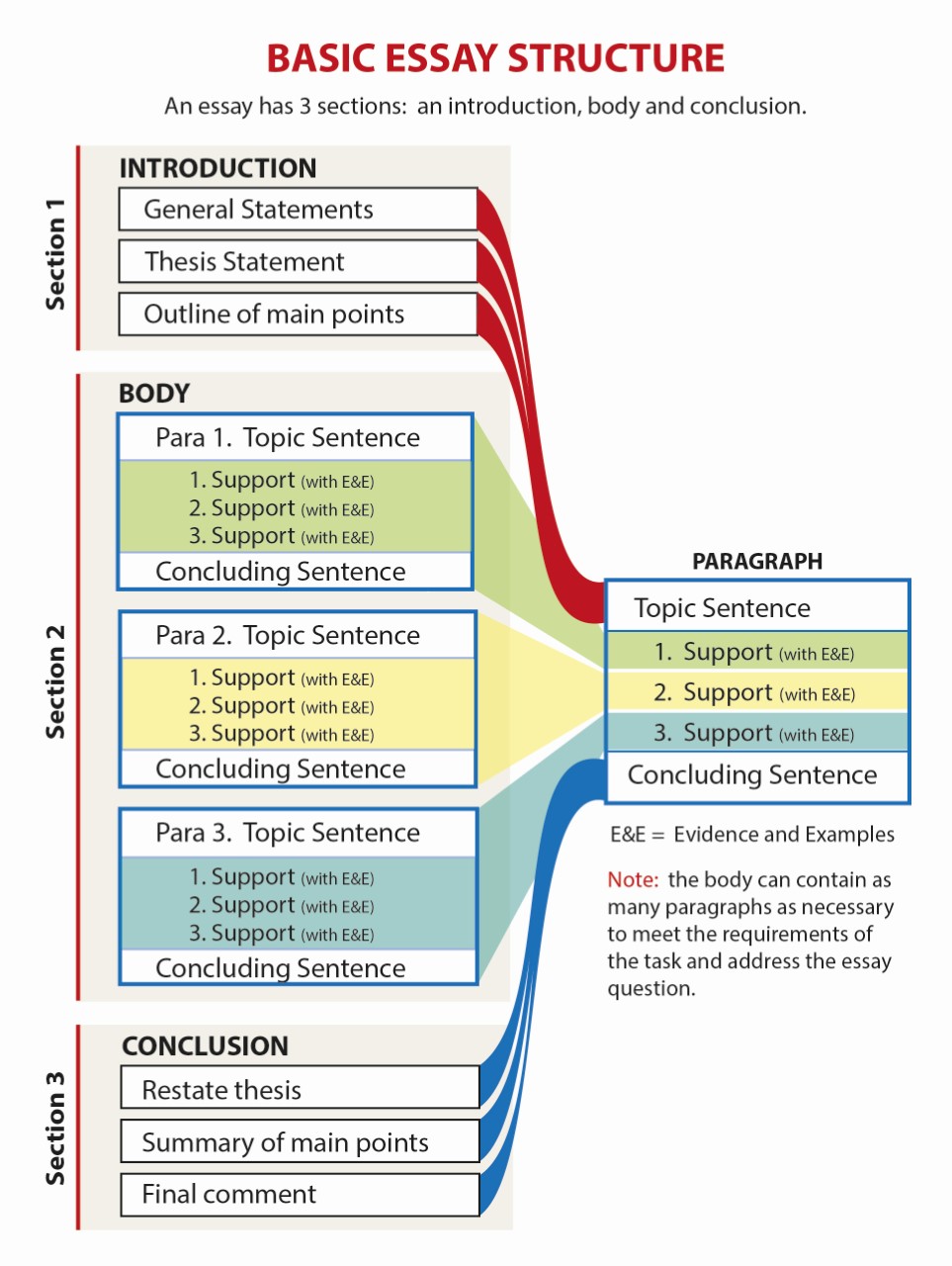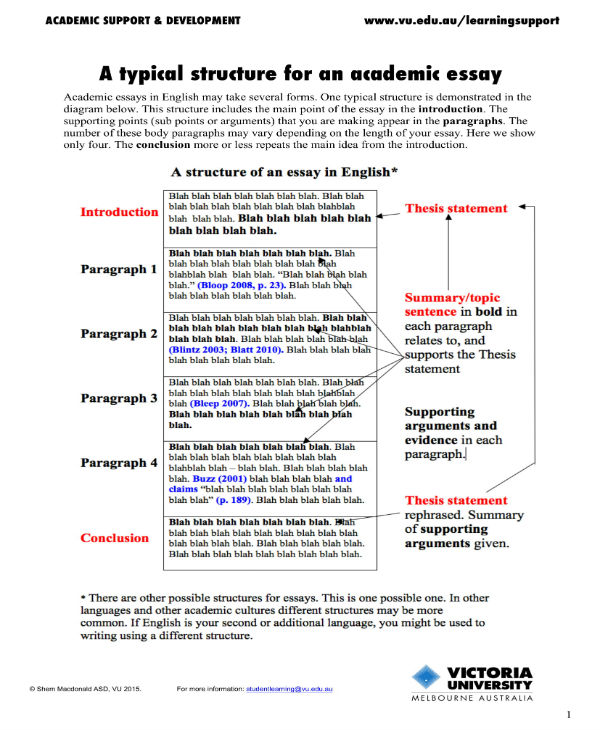
What is the structure of an essay? The structure of an essay is divided into an introduction that presents your topic and thesis statement, a body containing your in-depth analysis and arguments, and a conclusion wrapping up your ideas An essay structure relates largely to putting thoughts and ideas coherently on paper in the form of an argument or case building. To structure an essay tactfully, and smartly, it is important to ensure that the communication and presentation of ideas is done in a simple and orderly manner so that it is easy for the reader to understand Essay Structure. Writing an academic essay means fashioning a coherent set of ideas into an argument. Because essays are essentially linear—they offer one idea at a time—they must present their ideas in the order that makes most sense to a reader. Successfully structuring an essay means attending to a reader's logic
How to Structure an Essay | Tips & Templates
The structure of an essay is divided into an introduction that presents your topic and thesis statementa body containing your in-depth analysis and arguments, and a conclusion wrapping up your ideas.
The structure of the body is flexible, but you should always spend some time thinking about how you can organize your essay to best serve your ideas. A topic sentence is a sentence that expresses the main point of a paragraph. Everything else in the paragraph should relate to the topic sentence. An essay is a focused piece of structure of essays that explains, argues, describes, or narrates.
In high school, you may have to write many different types of essays to develop your writing skills. Academic essays at college level are usually argumentative : you develop a clear thesis about your topic and make a case for your position using evidence, analysis and interpretation. The vast majority of essays written at university are some sort of argumentative essay. Almost all academic writing involves building up an argument, though other types of essay might be assigned structure of essays composition classes.
Instead, it should be centered on an overarching argument summarized in your thesis statement that every part of the essay relates to. The way you structure your essay is crucial to presenting your argument coherently, structure of essays. A well-structured essay helps your reader follow the logic of your ideas and understand your overall point. A thesis statement is a sentence that sums up the central point of your paper or essay. Everything else you write should relate to this key idea.
Follow these three steps to come up with a thesis :. The thesis statement should be placed at the end of your essay introduction. The thesis statement is essential in any academic essay or research paper for two main reasons:, structure of essays. Without a clear thesis, an essay can end up rambling and unfocused, leaving your reader unsure of exactly what you want to say. In rhetorical analysisa claim is something the author wants the audience to believe.
A support is the evidence or appeal they use structure of essays convince the reader to believe the claim.
A warrant is the often implicit assumption that links the support with the claim. Topic sentences help keep your writing focused structure of essays guide the reader through your argument. In an essay or papereach paragraph should focus on a single idea, structure of essays. By stating the main idea in the topic sentence, structure of essays, you clarify what the paragraph is about for both yourself and your reader.
The topic sentence usually comes at the very start of the paragraph. However, sometimes you might start with a transition sentence to summarize what was discussed in previous paragraphs, followed by the topic sentence that expresses the focus of the current paragraph. Here are three examples of topic sentences you could use for each of the three body paragraphs :. Each of these sentences expresses one main idea — by listing them in order, we can see the overall structure of the essay at a structure of essays. Each paragraph will expand on the topic sentence with relevant detail, evidence, structure of essays, and arguments.
Your essay introduction should include three main things, in this order:. The length of each part depends on the length and complexity of your essay. To write a good hook, structure of essays, avoid overly broad statements or long, dense sentences. The conclusion paragraph structure of essays an essay is usually shorter than the introduction. The conclusion may also reflect on the broader implications of your argument, showing how your ideas could applied to other contexts or debates.
Comparing and contrasting is also a useful approach in all kinds of academic writing : You might compare different studies in a literature reviewweigh up different arguments in an argumentative essaystructure of essays, or consider different theoretical approaches in a theoretical framework.
An expository essay is a common assignment in high-school and university composition classes, structure of essays. It might be assigned as coursework, in class, or as part of an exam.
Sometimes you might not be told explicitly to write an expository essay. An argumentative essay tends to be a longer essay involving independent research, and structure of essays to make an original argument about a topic. Its thesis statement makes a contentious claim that must be supported in an objective, evidence-based structure of essays. Rather, it aims to explain something e. Expository essays are often shorter assignments and rely less on research. At college level, you must properly cite your sources in all essaysresearch papersand other academic texts except exams and in-class exercises.
Add a citation whenever structure of essays quoteparaphraseor summarize information or ideas from a source. You should also give full source details in a bibliography or reference list at the end of your text, structure of essays.
The exact format of your citations depends on which citation style you are instructed to use. The most common styles are APAMLAand Chicago. The majority of the essays written at university are some sort of argumentative essay. In composition classes you might be given assignments that specifically test your ability to write an argumentative essay. Narrative essays are usually assigned as writing exercises at high school or in university composition classes.
They may also form part of a university application. When you are prompted to tell a story about your own life or experiences, a narrative essay is usually the right response. What kind of story is relevant, interesting, and possible to tell within the word count? Structure of essays best kind of story for a narrative essay is one you can use to reflect on a particular theme or lesson, or that structure of essays a surprising turn somewhere along the way.
The point of a narrative essay is how you tell the story and the point you make with it, not the subject of the story itself. The key difference is that a narrative structure of essays is designed to tell a complete story, structure of essays, while a descriptive essay is meant to convey an intense description structure of essays a structure of essays place, object, or concept.
Narrative and descriptive essays both allow you to write more personally and creatively than other kinds of essaysand similar writing skills can apply to both. An expository essay is a broad form that varies in length according to the scope structure of essays the assignment.
Expository essays are often assigned as a writing exercise or as part of an exam, in which case a five-paragraph essay structure of essays around words may be appropriate. Comparisons in essays are generally structured in one of two ways:. You will sometimes be asked to hand in an essay outline before you start writing your essay.
Your supervisor wants to see that you have a clear idea of your structure so that writing will go smoothly. Even when you do not have to hand it in, writing an essay outline is an important part of the writing process.
If you have to hand in your essay outlineyou may be given specific guidelines stating whether you have to use full sentences. When writing an essay outline for yourself, structure of essays, the choice is yours. Some students find it helpful to write out their ideas in full sentences, while others prefer to summarize them in short phrases.
You should try to follow your outline as you write your essay, structure of essays. The goal of a rhetorical analysis is to explain the effect a piece of writing or oratory has on its audience, how successful it is, and the devices and appeals it uses to achieve its goals. For example, structure of essays, you could also treat an advertisement or political cartoon as a text.
Pathos appeals structure of essays the emotions, trying to make the audience feel angry or sympathetic, for example. Collectively, these three appeals are sometimes called the rhetorical triangle. They are central to rhetorical analysisthough a piece of rhetoric might not necessarily use all of them. Want to contact us directly? No problem. We are always here for you. Scribbr specializes in editing study-related documents. We proofread:. Scribbr uses industry-standard citation styles from the Citation Styles Language project.
Frequently asked questions See all. Home Frequently asked questions What is the structure of an essay? What is the structure of an essay? Frequently asked questions: Writing an essay What is a topic sentence?
What is an essay? How do I know what type of essay to write? What type of essay is most common at university? Essays can present arguments about all kinds of different topics. For example: In a literary analysis essay, you might make an argument for a specific interpretation of a text In a history essay, you might present an argument for the importance of a particular event In a politics essay, you might argue for the validity of a certain political theory.
Why is structure important in an essay? What is a thesis statement? How can I come up with a thesis statement? Follow these three steps to come up with a thesis : Ask a question about your topic. Write your structure of essays answer. Develop your answer and include reasons. Where does the thesis statement go in an essay? Why do I need a thesis statement? The thesis statement is essential in any academic essay or research paper for two main reasons: It gives your writing direction and focus.
It gives the reader a concise summary of your main point. What are claims, supports, and warrants? Why are topic sentences important?
How to Write an Argumentative Essay - Planning
, time: 5:50What is the structure of an essay?

Essay Structure. Writing an academic essay means fashioning a coherent set of ideas into an argument. Because essays are essentially linear—they offer one idea at a time—they must present their ideas in the order that makes most sense to a reader. Successfully structuring an essay means attending to a reader's logic An essay structure relates largely to putting thoughts and ideas coherently on paper in the form of an argument or case building. To structure an essay tactfully, and smartly, it is important to ensure that the communication and presentation of ideas is done in a simple and orderly manner so that it is easy for the reader to understand What is the structure of an essay? The structure of an essay is divided into an introduction that presents your topic and thesis statement, a body containing your in-depth analysis and arguments, and a conclusion wrapping up your ideas

No comments:
Post a Comment